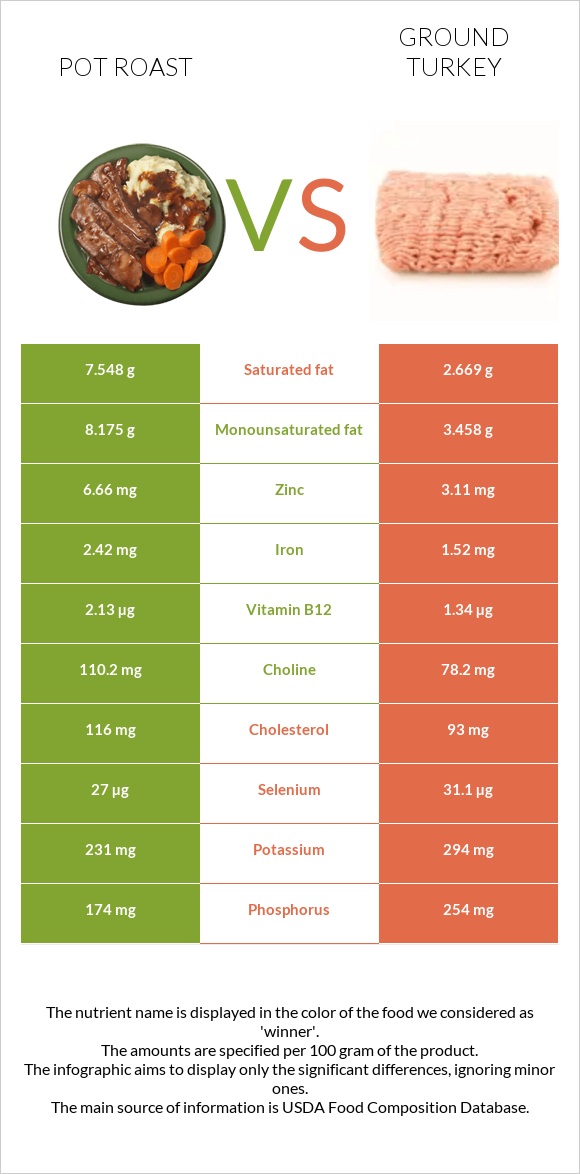Pot roast vs. Ground turkey — In-Depth Nutrition Comparison
Compare
How are pot roast and ground turkey different?
- Pot roast is higher in vitamin B12, zinc, and iron; however, ground turkey is richer in vitamin B3, vitamin B6, vitamin B5, phosphorus, and selenium.
- Daily need coverage for vitamin B12 for pot roast is 33% higher.
- Pot roast contains 3 times more saturated fat than ground turkey. While pot roast contains 7.548g of saturated fat, ground turkey contains only 2.669g.
Beef, chuck, arm pot roast, separable lean, and fat, trimmed to 0" fat, all grades, cooked, braised and Ground turkey, cooked are the varieties used in this article.
Infographic

Infographic link
Mineral Comparison
Mineral comparison score is based on the number of minerals by which one or the other food is richer. The "coverage" charts below show how much of the daily needs can be covered by 300 grams of the food.
| Contains more IronIron | +59.2% |
| Contains more ZincZinc | +114.1% |
| Contains less SodiumSodium | -39.7% |
| Contains more MagnesiumMagnesium | +57.9% |
| Contains more CalciumCalcium | +75% |
| Contains more PotassiumPotassium | +27.3% |
| Contains more CopperCopper | +52.5% |
| Contains more PhosphorusPhosphorus | +46% |
| Contains more SeleniumSelenium | +15.2% |
Vitamin Comparison
Vitamin comparison score is based on the number of vitamins by which one or the other food is richer. The "coverage" charts below show how much of the daily needs can be covered by 300 grams of the food.
| Contains more Vitamin EVitamin E | +363.6% |
| Contains more Vitamin B12Vitamin B12 | +59% |
| Contains more Vitamin KVitamin K | +∞% |
| Contains more FolateFolate | +28.6% |
| Contains more Vitamin AVitamin A | +∞% |
| Contains more Vitamin B1Vitamin B1 | +30.5% |
| Contains more Vitamin B2Vitamin B2 | +23.4% |
| Contains more Vitamin B3Vitamin B3 | +112.5% |
| Contains more Vitamin B5Vitamin B5 | +108.9% |
| Contains more Vitamin B6Vitamin B6 | +123.7% |
All nutrients comparison - raw data values
| Nutrient |  |
 |
DV% diff. |
| Vitamin B12 | 2.13µg | 1.34µg | 33% |
| Zinc | 6.66mg | 3.11mg | 32% |
| Vitamin B3 | 4.105mg | 8.724mg | 29% |
| Vitamin B6 | 0.283mg | 0.633mg | 27% |
| Saturated fat | 7.548g | 2.669g | 22% |
| Polyunsaturated fat | 0.708g | 2.917g | 15% |
| Fats | 19.17g | 10.4g | 13% |
| Vitamin B5 | 0.571mg | 1.193mg | 12% |
| Monounsaturated fat | 8.175g | 3.458g | 12% |
| Iron | 2.42mg | 1.52mg | 11% |
| Phosphorus | 174mg | 254mg | 11% |
| Cholesterol | 116mg | 93mg | 8% |
| Selenium | 27µg | 31.1µg | 7% |
| Copper | 0.099mg | 0.151mg | 6% |
| Choline | 110.2mg | 78.2mg | 6% |
| Calories | 297kcal | 203kcal | 5% |
| Protein | 28.94g | 27.37g | 3% |
| Magnesium | 19mg | 30mg | 3% |
| Vitamin A | 0µg | 24µg | 3% |
| Vitamin E | 0.51mg | 0.11mg | 3% |
| Vitamin B2 | 0.171mg | 0.211mg | 3% |
| Potassium | 231mg | 294mg | 2% |
| Vitamin B1 | 0.059mg | 0.077mg | 2% |
| Vitamin K | 1.8µg | 0µg | 2% |
| Calcium | 16mg | 28mg | 1% |
| Sodium | 47mg | 78mg | 1% |
| Folate | 9µg | 7µg | 1% |
| Vitamin D | 8 IU | 8 IU | 0% |
| Vitamin D | 0.2µg | 0.2µg | 0% |
| Manganese | 0.01mg | 0.011mg | 0% |
| Trans fat | 0.134g | N/A | |
| Tryptophan | 0.19mg | 0.312mg | 0% |
| Threonine | 1.156mg | 1.258mg | 0% |
| Isoleucine | 1.317mg | 1.227mg | 0% |
| Leucine | 2.302mg | 2.262mg | 0% |
| Lysine | 2.446mg | 2.452mg | 0% |
| Methionine | 0.754mg | 0.806mg | 0% |
| Phenylalanine | 1.143mg | 1.068mg | 0% |
| Valine | 1.436mg | 1.27mg | 0% |
| Histidine | 0.924mg | 0.811mg | 0% |
| Omega-3 - EPA | 0g | 0.01g | N/A |
| Omega-3 - DHA | 0g | 0.009g | N/A |
| Omega-3 - ALA | 0.136g | N/A | |
| Omega-3 - DPA | 0g | 0.012g | N/A |
| Omega-3 - Eicosatrienoic acid | 0.001g | N/A | |
| Omega-6 - Gamma-linoleic acid | 0.008g | N/A | |
| Omega-6 - Dihomo-gamma-linoleic acid | 0.011g | N/A | |
| Omega-6 - Eicosadienoic acid | 0.019g | N/A | |
| Omega-6 - Linoleic acid | 2.508g | N/A |
Macronutrient Comparison
Macronutrient breakdown side-by-side comparison
Protein:
28.94 g
Fats:
19.17 g
Carbs:
0 g
Water:
51.9 g
Other:
0 g
Protein:
27.37 g
Fats:
10.4 g
Carbs:
0 g
Water:
62.07 g
Other:
0.16 g
| Contains more FatsFats | +84.3% |
| Contains more WaterWater | +19.6% |
| Contains more OtherOther | +∞% |
~equal in
Protein
~27.37g
~equal in
Carbs
~0g
Fat Type Comparison
Fat type breakdown side-by-side comparison
Saturated fat:
Sat. Fat
7.548 g
Monounsaturated fat:
Mono. Fat
8.175 g
Polyunsaturated fat:
Poly. Fat
0.708 g
Saturated fat:
Sat. Fat
2.669 g
Monounsaturated fat:
Mono. Fat
3.458 g
Polyunsaturated fat:
Poly. Fat
2.917 g
| Contains more Mono. FatMonounsaturated fat | +136.4% |
| Contains less Sat. FatSaturated fat | -64.6% |
| Contains more Poly. FatPolyunsaturated fat | +312% |




